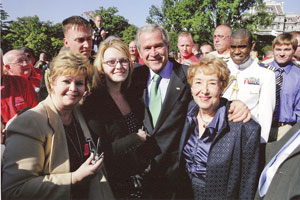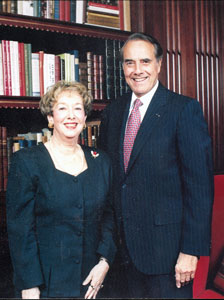 Esther Levens loves politics and she loves Israel. Her love for one or the other has crossed paths more than once in her life and led her in 1991 to found Voices United for Israel, known today as the Unity Coalition for Israel. Her work supporting Israel has brought her much joy and has earned her the respect of Israelis, Christians and now the Jewish community. She will be honored, along with her late husband Vrem, Sunday, Feb. 13, at BIAV’s annul Purim Gala. (For more information, or to make a reservation, contact Barry Rubin at BIAV at (913) 341-2444, e-mail , or go to www.BIAV.org/purimgala.)
Esther Levens loves politics and she loves Israel. Her love for one or the other has crossed paths more than once in her life and led her in 1991 to found Voices United for Israel, known today as the Unity Coalition for Israel. Her work supporting Israel has brought her much joy and has earned her the respect of Israelis, Christians and now the Jewish community. She will be honored, along with her late husband Vrem, Sunday, Feb. 13, at BIAV’s annul Purim Gala. (For more information, or to make a reservation, contact Barry Rubin at BIAV at (913) 341-2444, e-mail , or go to www.BIAV.org/purimgala.)
In a recent interview from her Prairie Village home, she said she has loved and supported Israel long before “the state was even a state.” She said she first starting believing in the importance of a Jewish state when she was a young woman in Kansas City working for United Jewish Social Services.
“I realized early on how really vulnerable Jews felt around the world,” she said.
A graduate of the University of Missouri-Kansas City, she worked with the very first wave of European refugees immigrating here following the Holocaust. She met them at the railroad station and was charged with finding them housing and kosher food.
Like many Jewish people at that time, Levens said she wasn’t really aware of what was happening during the Holocaust until after the fact because it wasn’t “accurately reported.” But the work she did with survivors was so important to her that she played an instrumental role in arranging some of the earliest Yom Ha’Shoah remembrance services in the state of Kansas. Eventually she was appointed by President George W. Bush to the U.S. Holocaust Memorial Council.
Politics and Israel
 Esther has been a widow since 1983, but she still beams when she discusses the way she and Vrem worked together for a variety of causes, including supporting the political career of Bob Dole. She vividly remembers the reason Vrem chose to support Dole, when he was still relatively unknown outside of Western Kansas, after meeting him in 1967 during his first campaign for Senate.
Esther has been a widow since 1983, but she still beams when she discusses the way she and Vrem worked together for a variety of causes, including supporting the political career of Bob Dole. She vividly remembers the reason Vrem chose to support Dole, when he was still relatively unknown outside of Western Kansas, after meeting him in 1967 during his first campaign for Senate.
“The very first question (Vrem) asked Bob Dole was how he felt about Israel. They were very satisfied with each other’s answers,” Esther said.
Esther said it was always important to Vrem how people felt about Israel, because he was extremely passionate about it.
“He had been involved in the Sonneborn group, which smuggled weapons to Israel and actually went to jail for that,” Esther said. (See related story below.)
As is often the case with married couples — they were married 21 years — Vrem’s causes often turned into Esther’s causes. So he asked her to host an event for the senatorial candidate. Although she was told that “nobody attends political things,” Esther said about 500 people filled the back yard of her ranch-style home for the event.
Over the years Vrem remained friends with Dole, and Dole and his wife, Elizabeth, are serving as honorary co-chairs of the Purim Gala.
Voice of millions
Esther didn’t concentrate completely on volunteer activities. Several times over the years she worked as a professional for Israel Bonds. But her experience with Dole’s political campaigns helped spur her toward forming Voices United for Israel.
“I realized how many unbelievably dedicated Christians there were and how absolutely huge these organizations are,” she said.
“It’s an incredible reservoir of support for Israel and nobody had tapped into it. What was really amazing to me is that most of these groups that we gathered together didn’t know each other before this. Everybody thought they were operating on their own,” Esther said.
When she founded the organization 20 years ago, Esther said people warned her that it wouldn’t work.
“There was a lot of mistrust on both sides.”
Today the Unity Coalition for Israel has convened an alliance of Christian and Jewish organizations actively working together to generate support for Israel. Its more than 200 autonomous partner organization represent more than 40 million people, making it the largest network of pro-Israel groups in the world.
Esther notes the group’s philosophy is Israel is not just a Jewish issue.
“Millions of Christians resolutely endorse the principle of peace with security for the state of Israel. Because we work closely together, and speak with a united voice, our message is being heard.”
Over the years, through several large conferences in Washington, D.C., featuring American and Israeli government officials, Esther has gained the respect of politicians from both countries.
One of those is Israeli Prime Minister Benjamin Netanyahu. In 1997 when he was serving his first term as prime minister, he sent Esther a letter following one of her Washington conferences, which he attended. He thanked her for her personal efforts, and the organization’s efforts, at a time when Israel was being subjected to many international pressures.
“The work of (UCI) is now more crucial than ever. I extend my warmest wishes to you, to the distinguished leaders, and to the rank and file of the organization represented by (UCI). Your success is Israel’s success,” the prime minister wrote.
Through her efforts she has made many friends from around the country and Israel, including Yitzchak Ben-Gad, the former consul general of Israel to the Midwest and to Florida and Puerto Rico.
“I met Esther Levens in the early 1990s. … Esther proved to be an energetic, determined and brave Jewish leader dedicated to the safety and security of the state of Israel. She worked tirelessly even under a barrage of opposition and obstacles along the way. No doubt, Esther fulfills the ideals of Sheet Chagall — a Woman of Valor. As our sages have said: ‘There are many women who excel, but you excel among them all,’ ” he said.
UCI
Today UCI’s programs include a speaker’s bureau, a three-day high school democracy seminar outreach program, daily e-mail news summaries and action alerts on current issues connecting UCI members to public officials in the United States and Israel.
She still serves as president and CEO of UCI. After all these years, she is also still dedicated to supporting and preserving Israel, reminding people she’s old enough to remember when there wasn’t an Israel.
“Young students don’t have that contrast and that sense of appreciation of our history. They take it for granted that Israel has always been there and it always will be there. They don’t realize the urgency and the immediate needs as they arise on the international scene to really rescue the Jewish state,” she said.
For more information regarding UCI, or to get on its daily e-mail list, visit www.israeliunitycoalition.org.
Vrem Levens: A friend of Israel
The late Vrem Levens is being honored posthumously at BIAV’s Purim Gala Sunday, Feb. 13, along with his wife, Esther. During most of his life he kept it a secret how he supported the Jewish state in its early years. Below are excerpts from a column Stan Rose wrote April 29, 1983, soon after Levens’ death:
In 1946, when Vrem joined that secret American organization called the Sonneborn Institute — Israel was not a state. It was still only a state of mind — a hope and a wish and a dream.
Rudolph Sonneborn, a wealthy New York Jew, had promised David Ben-Gurion, the eloquent Major Aubrey Eban (who later became better known as Abba Eban) and Haim Slavin, the arms manufacturing expert for Ben-Gurion, that he would recruit the necessary manpower to obtain surplus weapons — making tools to arm the Israelis for the coming War of Independence.
Thanks to the efforts of young men like Vrem Levens, the nation’s junkyards and factories were scoured for surplus tools that were taken apart, crated and smuggled by ship to the Israelis, while bribed custom officials looked the other way. By making good on the promise to arm Israel, the Sonneborn Institute helped make possible Israel’s victory in the 1948 War of Independence and its recognition as a nation.
Vrem was caught by federal authorities in the act of smuggling the machinery and punished as an example to show England and the Arab countries that the United States was not taking sides in the struggle over Palestine. (Levens told Rose), “Because we were sworn to secrecy, my part in the Sonneborn effort was never revealed. The judge sentenced me to 90 days, but later commuted the sentence to 60 days. I served those 60 days and the jail sentence is still on my record.”
Zvi Rafiah, a consultant for Israel on American affairs, said in later years, “Vrem always was ready to go to Washington and raise any issue of injustice to Israel with any legislator. He was listened to and respected because he had a brilliant grasp of Israel’s problems. It was never necessary to call him. He was always one step ahead of the rest of us. He always used his influence wisely and effectively.”



